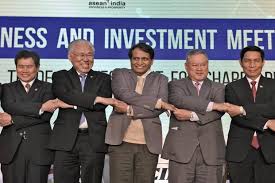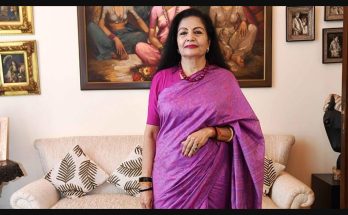
Ahead of the special India-ASEAN commemorative summit, India has underlined the need for a fair and balanced outcome for the Regional Comprehensive Economic Partnership, the largest free trade area which is currently under negotiation between 16 countries.In the run up to the summit on January 25 in New Delhi, India’s Commerce and Industry Minister Suresh Prabhu stressed that that India would agree to this mega free trade agreement provided sensitivities and aspirations of all partner countries are adequately addressed.
Speaking at the ‘ASEAN-India Business and Investment Meet and Expo’ in New Delhi on January 22, Mr Prabhu said: “It is important to address the sensitivity of member countries and their aspirations as negotiations gather momentum. We would all aim to achieve an RCEP that results in the realization of the potential of the three key pillars of RCEP—goods, services, investment—in a manner that is balanced and collectively satisfactory. Keeping this in view, India will be working closely and constructively with all RCEP member countries, particularly Asean, towards early conclusion of negotiations”.
Identifying services as the main engine of growth around the world today, the minister stressed that almost two thirds of India’s GDP is made up of services and the surplus from service trade helps it to cover its trade deficit to considerable extent. With an eye on facilitating the movement of professionals and skilled workers between the two blocs, India has been demanding a greater liberalization in the services sector as a key component of the RCEP.
Moreover, India objects to the proposal of doing away with the import tariffs due to its fears of a Chinese takeover of the Indian market. With 3.5 billion people and 30 per cent of the world’s GDP, the RCEP would be a formidable trade bloc of sixteen countries- 10 ASEAN members, Brunei Darussalam, Cambodia, Indonesia, Laos, Malaysia, Myanmar, the Philippines, Singapore, Thailand and Vietnam, and 5 others, Australia, China, India, Japan, South Korea and New Zealand.
“I believe India will stand with the ASEAN to conclude the RCEP this year….and will not disappoint,” said Indonesian Trade Minister Enggartiasto Lukita at the business meet. Indonesia has been a key player in advancing negotiations on the RCEP.
The theme of the ongoing ASEAN-India business meet is ‘Promoting Mutual Trade and Investment for Shared Prosperity,’ and includes discussions on building small and medium enterprises (SME) ecosystem to enhance entrepreneurial spirit and start-up culture in the region.
The RCEP negotiations, that started in November 2012, covers trade in goods, trade in services, investment, economic and technical cooperation, intellectual property, competition, dispute settlement, e-commerce, (SMEs) and other issues. Aiming for a bilateral trade figure of up to $200 billion by 2022, India and ASEAN will have to negotiate hard for a balanced RCEP.
Author Profile
- India Writes Network (www.indiawrites.org) is an emerging think tank and a media-publishing company focused on international affairs & the India Story. Centre for Global India Insights is the research arm of India Writes Network. To subscribe to India and the World, write to editor@indiawrites.org. A venture of TGII Media Private Limited, a leading media, publishing and consultancy company, IWN has carved a niche for balanced and exhaustive reporting and analysis of international affairs. Eminent personalities, politicians, diplomats, authors, strategy gurus and news-makers have contributed to India Writes Network, as also “India and the World,” a magazine focused on global affairs.
Latest entries
 DiplomacyApril 23, 2024Resetting West Asia, re-booting the world, but not fast enough: T.S. Tirumurti
DiplomacyApril 23, 2024Resetting West Asia, re-booting the world, but not fast enough: T.S. Tirumurti India and the WorldApril 22, 2024India’s G20 Legacy: Mainstreaming Africa, Global South in global agenda
India and the WorldApril 22, 2024India’s G20 Legacy: Mainstreaming Africa, Global South in global agenda DiplomacyApril 10, 2024Diplomat-author Lakshmi Puri pitches for women power at LSR
DiplomacyApril 10, 2024Diplomat-author Lakshmi Puri pitches for women power at LSR India and the WorldApril 6, 2024UN envoy pitches to take India’s solutions to the world stage
India and the WorldApril 6, 2024UN envoy pitches to take India’s solutions to the world stage







